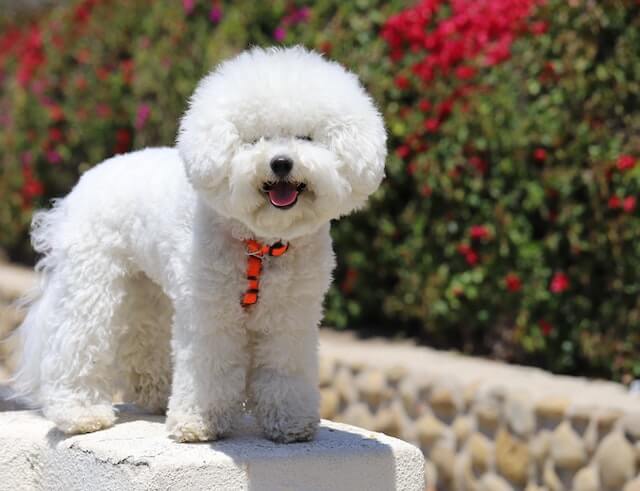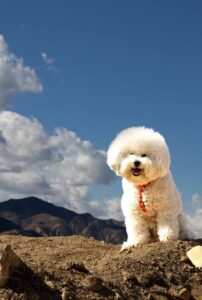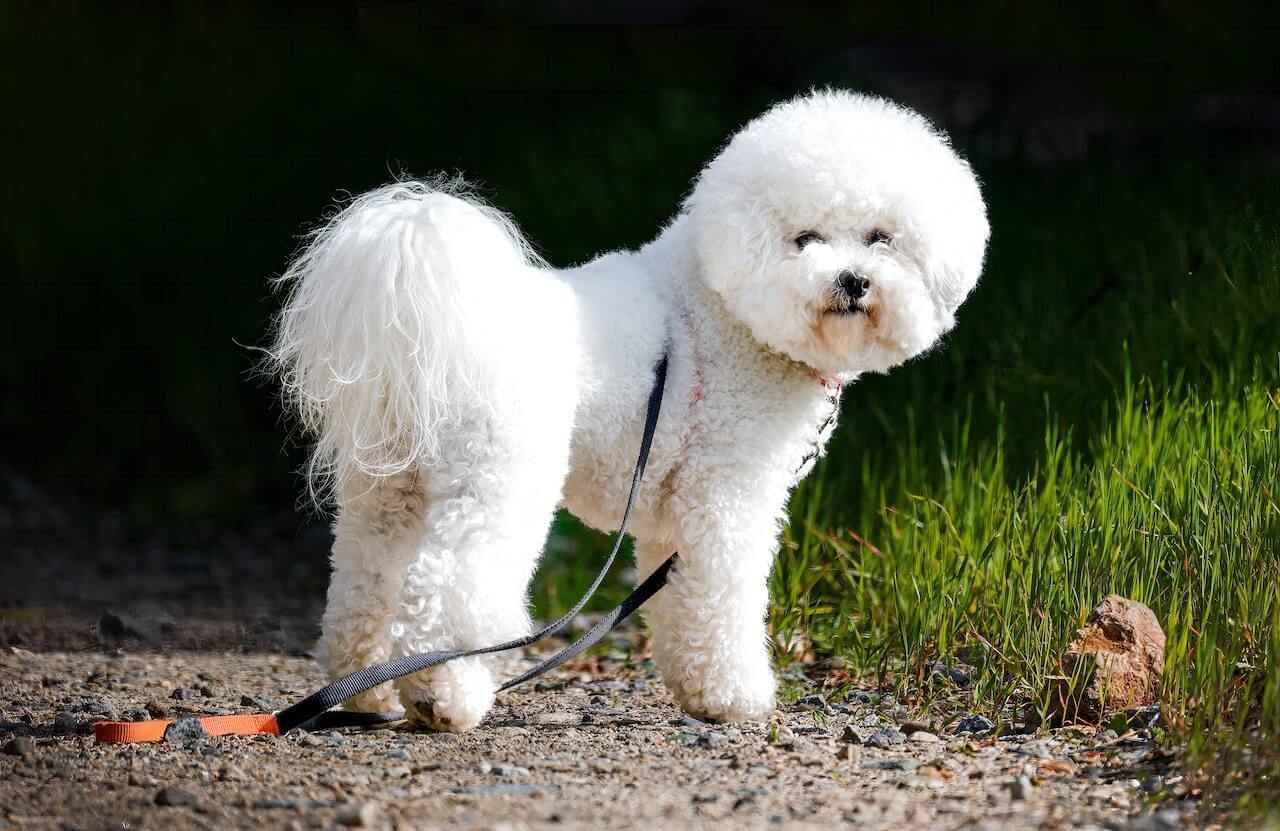Introduction
Welcome to our comprehensive guide on Bichon Frise prices in India for the year 2023. Thinking about bringing a cute Bichon Frise into your home? Awesome choice! But before you do, it’s good to know what you’re diving into, cost-wise and beyond. In this guide, we’ll chat about everything about Bichon – from their bubbly personality to their fluffy grooming needs. We’ll also touch on their health, how long they usually stick around, and what it’s like to train them. Plus, we’ve got some cool tidbits and answers to the questions everyone’s asking. By the end, you’ll have a clear picture of whether this fluffy friend is the right fit for you!
Bichon Frise Price In India
On average, Bichon Frise price in India ranges between INR 25,000 to INR 60,000 from a reputable breeder. However, it’s essential to keep in mind that prices can fluctuate, so it’s crucial to do your research and compare prices before making a purchase.
Bichon Frise Price: Major Indian Cities
| Bichon Frise price In Indian Cities | Different Cities |
| Bichon Frise price In Delhi | Rs.25 K – Rs. 60 K |
| Bichon Frise Price In Kolkata | Rs.25 K – Rs. 60 K |
| Bichon Frise price In Mumbai | Rs.25 K – Rs. 60 K |
| Bichon Frise price In Chennai | Rs.25 K – Rs. 60 K |
| Bichon Frise price In Bangalore | Rs.25 K – Rs. 60 K |
| Bichon Frise price In Coimbatore | Rs.25 K – Rs. 60 K |
| Bichon Frise price In Kerala | Rs.25 K – Rs. 50 K |
| Bichon Frise price In Nagpur | Rs.25 K – Rs. 60 K |
| Bichon Frise Price In Ahmedabad | Rs.25 K – Rs. 60 K |
| Bichon Frise Price In Lucknow | Rs.25 K – Rs. 50 K |
| Bichon Frise Price In Hyderabad | Rs.25 K – Rs. 50 K |
| Bichon Frise price In Pune | Rs.25 K – Rs. 60 K |
| Bichon Frise Price In Jaipur | Rs.25 K – Rs. 50 K |
| Bichon Frise price In Guwahati | Rs.25 K – Rs. 50 K |
| Bichon Frise Price In Chandigarh | Rs.25 K – Rs. 50 K |
| Bichon Frise price In Dehradun | Rs.25 K – Rs. 50 K |
| Bichon Frise price In Punjab | Rs.25 K – Rs. 50 K |
Factors Affecting Bichon Frise Prices in India
Several factors influence the prices of Bichon Frise puppies in India. These include:
Breeder Reputation: Well-established and reputable breeders who prioritize the health, genetics, and temperament of their puppies often charge higher prices.
Lineage of the Puppy: Bichon Frise puppies with exceptional bloodlines and show-quality potential typically have higher prices than those without a notable pedigree.
Location: Prices may vary across different cities in India due to differences in demand, availability, and cost of living.
Demand for the Breed: If the Bichon Frise breed is currently trendy or popular, it can drive up the prices as more people compete to own one of these adorable companions.
Associated Costs with Bichon Frise Ownership
Before bringing home a Bichon Frise, it’s essential to consider the associated costs involved in their ownership. Apart from the initial purchase price, some recurring expenses include:
Vet Care: Regular check-ups, vaccinations, preventive medications, and emergency medical care.
Food and Nutrition: Providing a balanced and high-quality diet that meets the nutritional needs of your Bichon Frise.
Grooming: Regular grooming sessions, professional grooming services, grooming tools, and supplies.
Training: Enrolling in obedience classes or hiring a professional trainer to ensure your Bichon Frise receives proper training and socialization.
Toys and Accessories: Providing toys, bedding, leashes, collars, and other accessories for your Bichon Frise’s comfort and entertainment.
Insurance: Optional but recommended for unexpected medical expenses or accidents.
Be prepared to spend an average of Rs40,000 to Rs60,000 per year on these additional expenses.

Breed Overview
| Attribute | Bichon Frise |
| Bichon Frise Origin | Canary Islands (Spain), Belgium/France (later development) |
| Bichon Frise Height | 23–28 cm (9–11 in) |
| Bichon Frise Coat | Medium length, silky, with corkscrew curls |
| Bichon Frise Color | White |
| Bichon Frise Life Span | 12–21 years |
| Bichon Frise Temperament | Merry, curious, gentle-mannered, sensitive, playful, affectionate. Can become territorial. |
| Grooming Needs | Requires regular grooming and nail trimming. |
| Exercise Needs | Moderate; enjoys playtime and short walks. |
| Training | Eager to please, making them relatively easier to train. |
| Adaptability | Adaptable to various living conditions, good for apartment living. |
| Health Concerns | Cataracts, diabetes, allergies, patellar luxation, heart disease, liver disease. |
| Special Characteristics | Hypoallergenic, low shedding, friendly with family, children, and other dogs. Less likely to drool. |
| Bichon Frise Puppy Price | Rs.25 K – Rs. 60 K |
A Brief History of Bichon Frise
The Bichon Frise, often referred to as the “cheerful little dog,” has a fascinating history that dates back to ancient times. Originally developed in the Mediterranean region, they were beloved companions to sailors and traders. Their charming personality and hypoallergenic coat made them popular amongst European nobility during the Renaissance. Over time, the Bichon Frise made their way to other parts of the world, enchanting dog lovers with their playful nature and irresistible charm.
Temperament of Bichon Frise
Bichon Frises are such sweethearts! They absolutely love being around people and quickly become a cherished part of any family. They’re super playful, always up for a cuddle, and they make friends wherever they go – whether it’s with kids, other pets, or even folks they’ve just met. If you’re looking for a furry friend who’s all about love and fun, a Bichon Frise might just be the perfect match for you.
Grooming Needs
With their beautiful white coat, the Bichon Frise requires regular grooming to keep them looking their best. Their soft, dense fur is prone to matting if not properly maintained. Daily brushing is recommended to prevent tangles and keep the coat in good condition. Additionally, periodic professional grooming sessions are necessary to maintain the Bichon Frise’s signature “powder puff” appearance. Some owners opt for professional groomers who specialize in Bichon Frise cuts to achieve the classic look that showcases their adorable features.
Life Span
On average, Bichon Frises have a relatively long lifespan compared to other dog breeds. With proper care, nutrition, and regular exercise, they can live between 12 to 15 years. However, it’s important to note that individual health, genetics, and lifestyle factors can influence their specific lifespan.
Training Needs
Bichon Frises are intelligent and eager to please, making them generally easy to train. However, consistency and positive reinforcement are key to successful training sessions with this breed. They respond well to reward-based training methods and benefit from early socialization to develop good manners and become well-adjusted members of the family.
Health Issues
While the Bichon Frise is generally a healthy breed, they may still be prone to certain health issues. These can include:
Allergies: Bichon Frises are known to have allergies, especially to environmental factors such as pollen and dust mites. Regular veterinary check-ups and a clean living environment can help manage these allergies.
Dental Problems: Like many small dog breeds, Bichon Frises can be prone to dental issues such as dental decay and gum disease. Regular teeth brushing and dental check-ups are essential for maintaining their oral health.
Luxating Patella: This is a condition where the kneecap dislocates from its normal position. It can cause lameness and discomfort for the dog and may require surgical intervention.
Cataracts: Bichon Frises may develop cataracts, which can affect their vision. Regular eye examinations by a veterinarian are important for detecting and managing this condition.
Bladder Stones: Some Bichon Frises are prone to developing bladder stones. Providing them with a balanced diet and ensuring they have access to fresh, clean water can help reduce the risk.

Pros & Cons of Owning a Bichon Frise
Pros:
- They have a friendly and sociable temperament, making them great companions for families and individuals alike.
- Bichon Frises are hypoallergenic, making them suitable for people with allergies.
- Their small size makes them adaptable to different living spaces, including apartments or houses with limited space.
- They are generally easy to train and respond well to positive reinforcement methods.
Cons:
- Bichon Frises require regular grooming to maintain their coat, which can be time-consuming and may incur additional costs for professional grooming services.
- As a companion breed, they thrive on human interaction and may experience separation anxiety if left alone for long periods.
- They may be prone to certain health issues, necessitating regular veterinary care and potential medical expenses.
Fun Facts
The Bichon Frise has a distinctive curly white coat that resembles a cotton ball, enhancing its adorable appearance.
They have a natural talent for performing tricks and are often seen participating in dog shows and competitions showcasing their agility and intelligence.
Despite their small size, Bichon Frises have a surprisingly loud bark, which can make them excellent watchdogs.
They have been featured in various forms of popular culture, including movies, television shows, and even as mascots for certain brands.
FAQs
Q. Are Bichon Frises suitable for families with children?
A. Yes, Bichon Frises are generally great with children. They enjoy playful interactions and have a gentle nature that makes them wonderful companions for kids.
Q. Do Bichon Frises shed a lot?
A. No, Bichon Frises are considered to be a low-shedding breed. Their hypoallergenic coat grows continuously, similar to human hair, and requires regular grooming to prevent matting.
Q. Are Bichon Frises high-energy dogs?
A. While Bichon Frises have moderate energy levels, they do require daily exercise to keep them mentally and physically stimulated. Regular walks and playtime are essential to their well-being.
Q. Can Bichon Frises be left alone for long periods?
A. Bichon Frises thrive on human companionship and prefer not to be left alone for extended periods. They can experience separation anxiety if left alone for too long and may benefit from having a companion animal or the assistance of a dog sitter or dog daycare.
Q. Are Bichon Frises hypoallergenic?
A. Yes, Bichon Frises are often considered hypoallergenic because they have hair instead of fur, which produces fewer allergens. However, no dog breed is completely hypoallergenic, so it’s recommended that individuals with allergies spend time with a Bichon Frise before bringing one home.
Q. How much exercise does Bichon Frises need?
A. Bichon Frises are moderately active dogs and require daily exercise to keep them healthy and happy. Daily walks, interactive playtime, and mental stimulation are important for their well-being. They can adapt well to apartment living as long as they receive sufficient exercise.
Q. Are Bichon Frises easy to train?
A. Bichon Frises are intelligent and eager to please, which makes them trainable. Positive reinforcement methods, such as treats, praise, and consistency, work well with this breed. However, like any dog, early socialization and consistent training are essential to ensure good behavior.
Q. Do Bichon Frises get along with children and other pets?
A. Yes, Bichon Frises are known for their friendly and sociable nature, which usually makes them good companions for children and other pets. However, proper socialization and teaching children how to interact with dogs are important to ensure positive interactions.
Q. Is a Bichon Frise a one-person dog?
A. No, Bichon Frises are not typically one-person dogs. They are known for their friendly and sociable nature, which makes them good companions for multiple family members. They enjoy interacting with people and forming strong bonds with their owners and anyone who shows them love and care.
Q. Is Bichon Frise a good house dog?
A. Yes, Bichon Frises make excellent house dogs. They have a small size, adaptable nature, and are well-suited to indoor living. Their friendly demeanor and low-shedding coat make them well-suited for families living in apartments or homes without large yards. However, they do require regular exercise and mental stimulation to keep them happy and healthy.
Q. How to pronunciation Bichon Frise?
A. The pronunciation of “Bichon Frise” is “BEE-shon free-ZAY.” The first part, “BEE-shon,” is pronounced like “be” with a “shon” sound at the end. The second part, “free-ZAY,” rhymes with “say.”
Key Takeaways
In wrapping up, the Bichon Frise is undeniably a bundle of joy, bringing warmth, laughter, and companionship to any home they enter. Their fluffy appearance and heartwarming temperament make them a favorite among dog lovers. However, like any pet, they come with responsibilities, from grooming to health care.
If you’re prepared for the commitment, a Bichon Frise can be a lifelong friend, offering unconditional love and countless cherished memories. As you consider welcoming this delightful breed into your life, remember that the rewards of their companionship far outweigh the challenges. Here’s to many happy moments with your potential fluffy companion!
You May Also Like

2 thoughts on “Bichon Frise Price in India 2023: FAQ’S & Fun Facts”